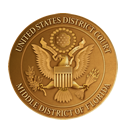The United States District Court for the Middle District of Florida is one of 94 trial courts in the federal court system. Federal courts can decide only certain types of cases. This is known as “subject matter jurisdiction."
- A dispute that involves a right in the United States Constitution;
- A dispute that involves a federal law (as opposed to a state law or local ordinance);
- A dispute that involves the United States of America (or any of its agencies, officers, or employees in their official capacities) as a party; and
- A dispute between citizens of different states with an amount in controversy that is more than $75,000.
If your dispute does not fall into any of those four categories, you should not file your lawsuit in this court. Instead, consider state, local, or administrative courts (or perhaps arbitration, mediation, or other types of alternative-dispute-resolution means).
If your dispute falls into one of those four categories and you want to proceed in federal (as opposed to state) court, you must decide whether the Middle District of Florida is the correct venue. Generally, you may file a civil case in the district where any defendant lives or where the claim arose (28 U.S.C. §1391). If that district is the Middle District of Florida, you then must figure out the proper division of the Middle District of Florida. There are five divisions with clerk’s offices. Division offices and their associated counties are:
- Fort Myers: Charlotte, Collier, DeSoto, Glades, Hendry, and Lee
- Jacksonville: Baker, Bradford, Clay, Columbia, Duval, Flagler, Hamilton, Nassau, Putnam, St. Johns, Suwannee, and Union
- Ocala: Citrus, Lake, Marion, and Sumter
- Orlando: Brevard, Orange, Osceola, Seminole, and Volusia
- Tampa: Hardee, Hernando, Hillsborough, Manatee, Pasco, Pinellas, Polk, and Sarasota
